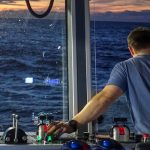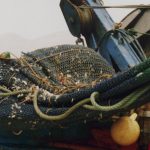In Philippines Davao city is the only place where a fishery product may pass through without paying taxes on its way to auction destinations in Japan, Canada and the USA. Therefore, transshipment of tuna is a new phenomenon for business. According to the information transshipment all started in 1995 when a Taiwanese group came to visit the Davao Fish Port Complex (DFPC) and found that it was near enough to international tuna fishing grounds.
It is told that during those days transshipment was not allowed in order to protect local fishermen and the tuna industry. Realizing that transshipment could be a new business opportunity, the government of Philippines enacted the Philippine Fisheries Code in 1998 that allowed the use of land, sea and air facilities for transshipment. The DFPC so far is the country’s only designated transshipment port.
Presently, six companies representing foreign vessels handle the transshipment activities. Mario Malinao, DFPC manager, opined that technically, tuna caught in international waters cannot be sold in the local market without paying customs duty. He added that otherwise, it’s illegal. The DFPC is managed by the Department of Agriculture’s Philippine Fisheries Development Authority (PFDA).
It is said that upon the request of the local government, the Agriculture department issued a Certificate of Necessity to Import allowing non-sashimi grade tuna for local sale. Duty is paid for by processing plants, wet market traders and “institutional buyers,” such as hotels and restaurants. In 2008, transshipment contributed considerable amount of money to the local economy.








